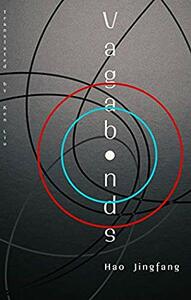Take a photo of a barcode or cover
Want a heavy-handed plow through the question of Western Capitalism and Chinese Communism? Well, here's a thinly-veiled discussion for you. Although I know many Chinese writers are using science fiction as a way to explore questions they couldn't explore in traditional fiction due to the censorship in China, the pages and pages devoted to the question of which is economic system is better, the utility of protest, and the differences of perspectives on generational change, makes it a difficult read at best. I was constantly reminded of early twentieth century satire, like some of the less lauded work of Aldous Huxley, where the author lets his/her characters speak the things the author believes or struggles with.
In short, unless you are really interested in modern Chinese political commentary, this one isn't worth it.
In short, unless you are really interested in modern Chinese political commentary, this one isn't worth it.
hopeful
reflective
slow-paced
Plot or Character Driven:
Character
Strong character development:
Complicated
Loveable characters:
No
Diverse cast of characters:
No
Flaws of characters a main focus:
No
Too long for what it is - I'm definitely more interested in all the events that take place before the book starts than the ones in the book
Falls into too many YA trappings that devalue the more mature politics discussed
Falls into too many YA trappings that devalue the more mature politics discussed
Thank you to BookishFirst and Hao Jiangfang for the opportunity to review the first 20 pages of this book for a First Impression.
In fairness to the author, I simply think 20 pages is not enough of this book to have generated an emotional drive to continue. The summary of the book premise was intriguing, and I was excited to try the book. Much of the first 20 pages was spent talking about the historical conflict between Earth and its Martian colony, and talking about people celebrating and saying goodbye to one another. No significant action or one character was sufficiently developed to focus my attention and I found myself not interested in continuing beyond the initial 20 pages provided in this first impression. The book was not offensive or so poorly written as to be deemed a waste of my time. Rather, this strikes me as a book that I'd perhaps need 2 or 3 chapters to get fully settled into the story. Not every book strikes a chord with the reader at 20 pages, and this is one of them.
In fairness to the author, I simply think 20 pages is not enough of this book to have generated an emotional drive to continue. The summary of the book premise was intriguing, and I was excited to try the book. Much of the first 20 pages was spent talking about the historical conflict between Earth and its Martian colony, and talking about people celebrating and saying goodbye to one another. No significant action or one character was sufficiently developed to focus my attention and I found myself not interested in continuing beyond the initial 20 pages provided in this first impression. The book was not offensive or so poorly written as to be deemed a waste of my time. Rather, this strikes me as a book that I'd perhaps need 2 or 3 chapters to get fully settled into the story. Not every book strikes a chord with the reader at 20 pages, and this is one of them.
I didn't know what to expect going into this book, but a slower science fiction themed meditation on east west relations. I was shocked by essentially the complete lack of action. I initially was on the fence because of the pacing being so slow, but as the story progressed and you saw the struggles of the various characters throughout it made a lot of sense. I ended up loving this book by the end and was even tearing up in the final chapter. maybe I'm a sap but I couldn't put it down once it got it's hooks in me.
adventurous
dark
emotional
hopeful
slow-paced
Plot or Character Driven:
Character
Strong character development:
Yes
Loveable characters:
Complicated
Diverse cast of characters:
Yes
Flaws of characters a main focus:
Yes
It had its moments. But there were a lot of moments that didn't capture my interest at all--I spent a lot of time zoning out during this book.
Maybe it was a good book, but it definitely wasn't a book for me. Too political, too introspective, and too little actual plot. And a lot of the dialogue sounded super unnatural...
Poor Enka. That part hurt me.
Maybe it was a good book, but it definitely wasn't a book for me. Too political, too introspective, and too little actual plot. And a lot of the dialogue sounded super unnatural...
Poor Enka. That part hurt me.
emotional
reflective
slow-paced
Plot or Character Driven:
Character
Strong character development:
Yes
Loveable characters:
Complicated
Diverse cast of characters:
Complicated
Flaws of characters a main focus:
No
adventurous
challenging
emotional
hopeful
reflective
sad
medium-paced
Plot or Character Driven:
A mix
Strong character development:
Yes
Loveable characters:
Yes
Diverse cast of characters:
Yes
Flaws of characters a main focus:
Yes
The central metaphor is SO interesting I just wish the book were good.




